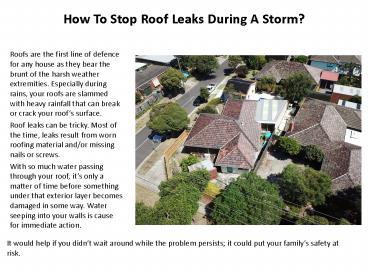How To Stop Roof Leaks During A Storm? - PowerPoint PPT Presentation
Title:
How To Stop Roof Leaks During A Storm?
Description:
Roofs are the first line of defense for any house as they bear the brunt of the harsh weather extremities. Especially during rains, your roofs are slammed with heavy rainfall that can break or crack your roof’s surface. – PowerPoint PPT presentation
Number of Views:38
Title: How To Stop Roof Leaks During A Storm?
1
How To Stop Roof Leaks
During A Storm?
- Roofs are the first line of defence for any house
as they bear the brunt of the harsh weather
extremities. Especially during rains, your roofs
are slammed with heavy rainfall that can break or
crack your roofs surface. - Roof leaks can be tricky. Most of the time, leaks
result from worn roofing material and/or missing
nails or screws. - With so much water passing through your roof,
its only a matter of time before something under
that exterior layer becomes damaged in some way.
Water seeping into your walls is cause for
immediate action.
It would help if you didnt wait around while the
problem persists it could put your familys
safety at risk.
2
A leaking roof is never a pleasant thing to deal
with. It can create a huge mess in your home and
cause damage that can lead to expensive roof
repairs. Find out more about what you can do to
prevent damage caused by leaking roofs here
- Locate the spots through which water seeps in.
- If you happen to have a leaky roof during a
storm, there are a few ways through which you can
avoid panic. Remain calm and find out the spots
through which water penetrates inside. To
minimise interior damage, place a bucket under
the identified leakage spot to catch water
safely. - To clean the wet areas and to avoid any
mishappening due to slipping, use towels to dry
out the water. Its important to check ceiling
boards for moisture or water leaks, and in case
there is a small dripping area of water, place a
bucket below the spot to accumulate the dripping
water to restrict it from spilling across your
house. Often, you will notice that the source of
the leaks is located in attics. The water might
drip from one spot, but mostly, it will spread
across the ceiling. - Placing a bucket and clearing the water with a
towel or rough cloth is a temporary solution for
your roof leaks. To avoid any further damage to
your structure, hire roof restoration experts.
They will fix your roof leaks and ensure its in
the best shape by undertaking necessary measures. - Use Roofing Tape
- Sticking some tape over a leak could be the
easiest roofing job youve done in a long time.
The tape wont fail you. It sticks to lots of
different surfaces and will hold the water for
long enough so that you can get to the source of
the leak and permanently repair it. - However, homeowners shouldnt consider roofing
tapes as the final solution. Fixing your roof
through repairs is a must to evade further
structural loss.
3
- Emergency Roof Tar
- Homeowners can do roof patching with the help of
roofing tar. It will help keep your roof tile in
a good place. Thats the reason why roofing tar
patching is required to seal the roof openings
and cracks. - Roofing tar patches, water-soluble and formulated
for use with tile roofs, are the best way to fix
an internal leak in a ceiling. If you see water
coming through the ceiling tiles, you can safely
take them off to find the source of the leak,
apply a roofing tar patch to seal the leak, and
then reinstall your tiles.
- Emergency roof covering
- In order to avoid water from entering your house,
prepare a plastic roof cover that will prevent
water from entering your house. It would help if
you could climb up into the attics and determine
the leaks exact location. You can use a 4-foot
roll of 6-mil polyethylene plastic as your
covering material. - If you have a plastic roll, then unroll the
plastic without unfolding it. Measure the entire
roof from the eave to the ridge and add an extra
4 feet to the estimated measure before you cut
the roll with a utility knife. Once you are done
with measurements, unfold the plastic to make it
into a wider area of 8 feet. - Once youve placed the plastic sheet over your
roof, staple it or nail it to avoid its
displacement. It is best to let the extra
covering hang over the roof, easing water outflow.
4
Tools and equipment required for such temporary
fixes
- Bucket
- Hammer
- Towels or rough cloth
- Measuring Tape
- Ladder
- Nails and screws
- Roofing Tar
- Utility Knife
- Rain Gear
- 6-mil polyethylene plastic sheet roll
- Rubber-soled shoes
- Sponge
- Staple Gun and its pins
5
Warning In order to identify roof leaks or the
spot through which the water penetrates inside of
your house, homeowners require to climb up the
attics and, in some cases, to the roof as well.
You require an A-shaped ladder that is 2 feet
above your roofs level for a roof inspection.
Without adequate measures, it can be risky for
homeowners to climb the roof or attics. Even when
you get to the roof, at all times, you must have
your one leg over the ladder. A small miss can be
dangerous and can lead to serious
injuries. Thus, it is advisable to have roof
repair experts inspect and fix your roof. They
have the necessary tools and equipment for
handling water leaks and your roofing project.
Original Source
https//www.articlesreader.com/stop-roof-leaks-dur
ing-a-storm/































